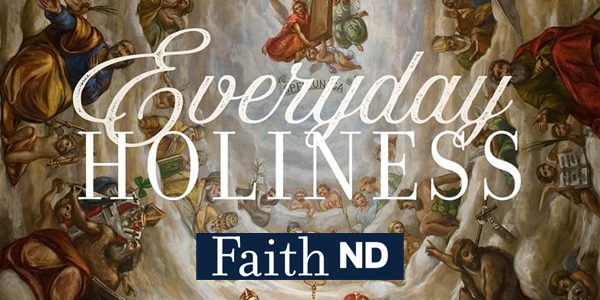The Eucharist and Human Dignity
Thursday, April 4, 2024 12:00 pm EST
In 2022, the United States Conference of Catholic Bishops (USCCB) announced that the Church in this country would undertake a Eucharistic Revival, as a way to bolster Catholics’ belief in the real presence of Christ–body, blood, soul, and divinity–in the Eucharist. This Eucharistic Revival will culminate in a nationwide pilgrimage to the city of Indianapolis in July 2024. In the months leading up to this pilgrimage, the McGrath Institute for Church Life is contributing to this revival by underscoring the intrinsic connection between the Eucharist and Catholic social teaching.
Why are we concerned about the link between Eucharistic devotion among Catholics and our commitment to social justice? Because the Catechism of the Catholic Church teaches that “the Eucharist commits us to the poor” (CCC, n. 1397). Because Pope Benedict XVI declared in his encyclical Deus Caritas Est that “A Eucharist which does not pass over into the concrete practice of love is intrinsically fragmented” (Deus Caritas Est, n.14. ). And because we have it on good authority that whenever we feed the hungry, give drink to the thirsty, shelter the homeless, welcome the stranger, we encounter Christ, Who assures that whatever you have done to the least among you, you do for me (cf. Matthew 25:31-46). Thus our devotion to the Body of Christ in the Eucharist must be accompanied by our equally fervent devotion to serve the entire human family, especially the poor and those who are in any way oppressed.
This theme will be taken up by the Office of Life and Human Dignity at the McGrath Institute for Church Life in an eight-part series of The Eucharist and Catholic Social Teaching. In our second event, Clemens Sedmak, Ph.D. will reflect on the connection between human dignity and the Eucharist with special attention to the dignity of people at the margins. He reconstructs the relevance for the liturgy for a deep understanding of a preferential option for the poor, and works with examples of how the Eucharist has lifted up the dignity of people under difficult circumstances.
Clemens Sedmak, Ph.D. is a Professor of Social Ethics; Director of the Nanovic Institute for European Studies at the Keough School of Global Affairs at the University of Notre Dame.
For more information visit the McGrath Institute for Church Life. Register to receive emails about upcoming events from our Religion & Spirituality learning community by clicking on the button below.



